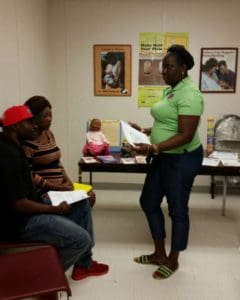Mother of four Lakima Ford has been a breastfeeding peer counselor at the Charles Harwood Complex, Christiansted, St. Croix clinic for the federal Women, Infants and Children nutritional program for five years. “I applied for the position at a time when I was a participant in the U.S. Program,” Ford said. “I had breastfed my children and thought it would be a good opportunity for me as it’s something I find interesting and like doing,” she said.

As part of the WIC team, “I connect with moms to educate them on the breastfeeding process,” Ford said. “I’m able to share my experiences and talk about the benefits. For new moms, I show them it’s nothing to be afraid of; it’s something that’s real healthy and good for her and the baby.”
WIC breastfeeding peer counselors understand the difficulties and provide realistic and practical guidance as a result of shared personal backgrounds and experience in ways that other health professionals cannot. Whether a mom is just learning about breastfeeding, beginning to breastfeed, or experiencing challenges, a peer counselor serves as a trusted coach to help moms meet their breastfeeding goals.
The American Academy of Pediatrics recommends infants receive only breast milk for about the first six months of life, and that they continue to be breastfed until at least 12 months, with the introduction of nutrient-rich foods starting at about six months of age. It recommends moms continue to breastfeed as long as mutually desired by mother and child. Benefits of breastfeeding are many. It lowers a baby’s risk of certain infections and diseases, including asthma, ear infections, Type-2 diabetes, and childhood leukemia and lessens the risk of Sudden Infant Death Syndrome. Breastfeeding can help moms recover more quickly from childbirth and reduce moms’ risk for certain breast and ovarian cancers. Breastfeeding may also help moms lose weight after childbirth.

While Ford typically connects with moms in-person at the clinic or hospital, the pandemic has shifted services to a remote delivery and telehealth model, connecting through phone calls, texts and video calls.
Ford conducts breastfeeding classes for WIC moms and families. “For most moms, the connections are going well and they are finding it helpful,” said Ford. “I have a mom that asked if I could hold a breastfeeding class on Zoom with her and other moms to get some ideas and hear from other moms in the program about their breastfeeding experience. But, I do have a mom that is having trouble with breastfeeding. We’ve connected through FaceTime so I can demonstrate how to latch and position the baby, but we’ve not been successful. For this mom, I’ll see if there is a way to do an in-person appointment.”
Ford, one of three peer counselors in the U.S. Virgin Islands Department of Health’s five WIC clinics serving 763 moms, typically works with five or six moms each month. Ford says most of the moms she works with are interested in breastfeeding. Presently 78 percent of Virgin Islands WIC moms breastfeed.
“During pregnancy, I’ll connect with moms usually every two weeks, and once the baby is born, I’ll make contact right away and check in every few days to check how it’s going and make sure they are successfully breastfeeding and provide support,” Ford said.
But, issues can arise anytime, and Ford recently helped a new mom in the middle of the night. “At 3 a.m. a mom called me because she couldn’t get her baby to latch on and asked if I could FaceTime with her and provide assistance,” Ford said. “I have a doll at home to show the mom how to hold the baby, nose to nose, skin to skin and let the baby gradually move himself up and latch on. I could see the mom was in pain because of engorgement, and she was scared. I asked her to give dad the baby and use the breast pump to release some of her milk supply. That went well and mom was able to hold the baby and position him to latch on and get the baby nursing. She was very excited and happy with that.”
“Virgin Islands WIC robustly supports breastfeeding and provides support to moms in whatever ways we can, and Ms. Ford exemplifies this commitment to support and assist our moms even in the middle of the night to live out our motto, Best Fed is Breast Fed,” said Lorna Concepcion, director of the V.I. WIC Program.
Ford’s favorite thing about peer counseling is, “getting to know the new moms and babies and sharing my breastfeeding successes. When I share with them that I breastfed my daughter until she was six years old, the moms are really excited and love hearing about that. It really motivates them to continue breastfeeding.”
“While never intended to be an emergency food program, WIC has been just as critical to families during the COVID-19 outbreak as SNAP, school and summer meals and the food distribution programs,” said Messner.
With the passage of the Families First Coronavirus Response Act, WIC received an increase in funding for the program, as well as increased ability to provide states with the flexibility they need to support mothers, infants and children that rely on WIC. Working with the states and local agencies, WIC was transformed. WIC appointments moved to a telehealth model, and nutrition and counseling services moved to a remote delivery model to protect the safety of WIC staff and participants.
“WIC has proven that a program that fostered in-person connections can continue to operate and serve families by pivoting its service model in the midst of a pandemic,” said Kurt Messner, Regional Administrator for the USDA Food and Nutrition programs throughout New England, New York and the U.S. Virgin Islands. “In fact, we’re looking at what may be possible for the future of WIC by leveraging innovative ideas, data-driven strategies, and new technology to improve the customer service provided to program participants. I commend the breastfeeding peer counselors. They empower moms to do something only they can do, and it happens to be what’s best for both moms and babies to thrive.”
The U.S. Virgin Islands received the WIC Loving Support Award of Excellence for exemplary breastfeeding support and practices from USDA in 2016.
The Special Supplemental Nutrition Program for Women, Infants, and Children, commonly known as WIC, provides federal grants to states for supplemental foods, health care referrals, and nutrition education for low-income pregnant and postpartum women, and to infants and children up to age five who are found to be at nutritional risk. USDA’s Food and Nutrition Service administers 15 nutrition assistance programs including WIC, which together comprise America’s nutrition safety net. For more information go to www.fns.usda.gov.
Each August, World and National Breastfeeding Week (August 1-7) is held in conjunction with Breastfeeding Month to promote breastfeeding as the premier source of nutrition for a baby’s first year of life.
USDA’s WIC Program serves about half of all babies born in the United States, and a USDA study* found that more than 95 percent of mothers who started breastfeeding reported that WIC played a role in their decision to breastfeed. Nearly 60 percent of caregivers also turned to WIC for information on feeding their infant, second only to their doctor or other health professional. Breastfeeding peer counselors working in WIC clinics perform the vital role of helping new mothers breastfeed.

“Since its beginning in 1974, the WIC Program has earned the reputation of being one of the most successful federally-funded nutrition programs in the nation,” said Messner. “This week, we recognize local WIC staff providing exemplary breastfeeding services.”


